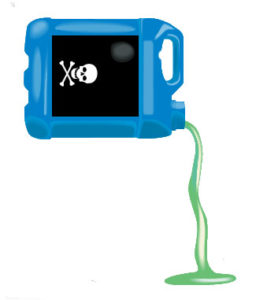Proactive Intervention Prevents Escalation
WHAT’S ANTIFREEZE DOING IN YOUR BUILDING?
Some time ago, our team was called to the 13th floor of an office building. The receptionist reported smelling a sweet chemical-like odor a few times every week. The scent was so powerful that it made her physically ill. Since she was the first person most people met when they set foot on the floor, everyone who came by could hear her concerns regarding the IAQ of the building.
When one of the company mechanics stopped by, she made a point to ask him about the odor. After hearing her description but not experiencing the smell for himself, the mechanic said, “You are probably smelling antifreeze. That’s something that should never be in a commercial office building.”
 Understandably, this upset the receptionist even more. Fortunately, the building manager reacted quickly to these complaints and called us. We looked at the HVAC systems, reviewed outside air deliveries, checked custodial chemicals, and collected background readings of general air quality. Nothing unusual came up. At the same time, the HSE (Health, Safety, and Environmental Department) for the tenant ran their own investigation. They conducted expensive tests but also reported “no problem found.”
Understandably, this upset the receptionist even more. Fortunately, the building manager reacted quickly to these complaints and called us. We looked at the HVAC systems, reviewed outside air deliveries, checked custodial chemicals, and collected background readings of general air quality. Nothing unusual came up. At the same time, the HSE (Health, Safety, and Environmental Department) for the tenant ran their own investigation. They conducted expensive tests but also reported “no problem found.”
Though both investigations found no cause for concern, a mysterious smell was still making the receptionist feel sick. This had the potential to become a real problem for the building owner. Suggestion is a powerful thing. Researcher James Pennebaker, Ph.D., of the University of Texas at Austin put it nicely: “If a visitor sits on your sofa, and you say, ‘My dog has fleas,’ watch them start scratching.” It doesn’t matter
if there are no fleas; just a suggestion can convince the brain there’s a problem. Likewise, if a receptionist tells people antifreeze in the building is making her sick, how long do you think it will be before other people feel sick, too?
Rather than close the book on the case and let her keep complaining with no solution, Travis West gave the receptionist his cell number. He instructed her to call him the next time she sensed the odor. Within two days, he received a call at 10:15 a.m. The receptionist said the odor was terrible, and she sounded so sick she could barely talk. Rushing down to the building, Travis searched through the floor area and looked for where the smell was strongest. As he did, he came upon a woman who was getting up to wash a dirty bowl. She’d just finished eating her breakfast of maple flavored oatmeal.
The receptionist identified the scent as the odor that made her sick. Sure enough, each time the woman made her oatmeal breakfast in the office break room, the receptionist became ill from the smell. The receptionist isn’t the only person to find the sweet smell of maple flavoring unbearable. Since then, we have received several similar complaints related to this breakfast cereal, and we’re now able to identify the source far quicker.
While building owners and property managers should respond quickly to complaints, it’s important that tenants be aware that IAQ is a shared responsibility. Be sure to provide your tenants with guidance on what they should and should not do in their shared space and how they can avoid inadvertently causing an IAQ concern.
And maybe don’t stock the break room with maple-flavored oatmeal.
